CIVIL LAW INTENTIONAL TORTS Intentional torts against physical

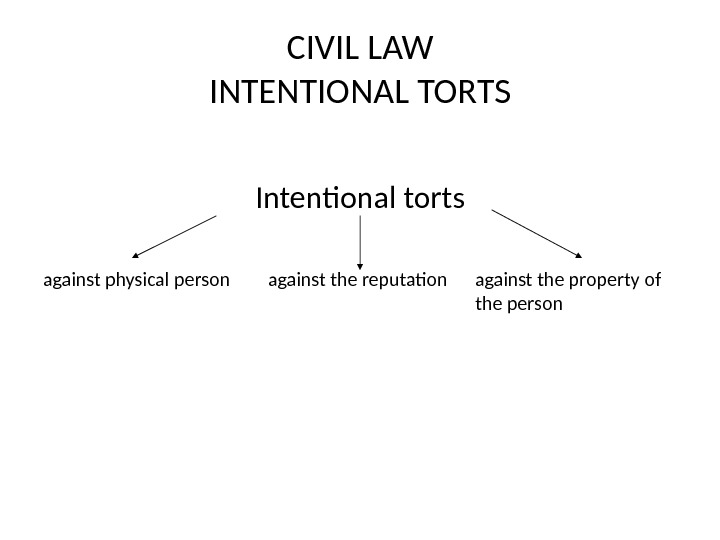
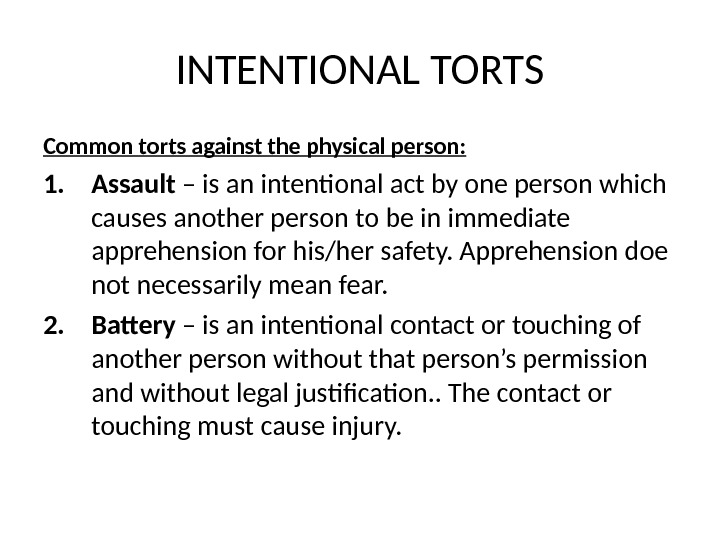

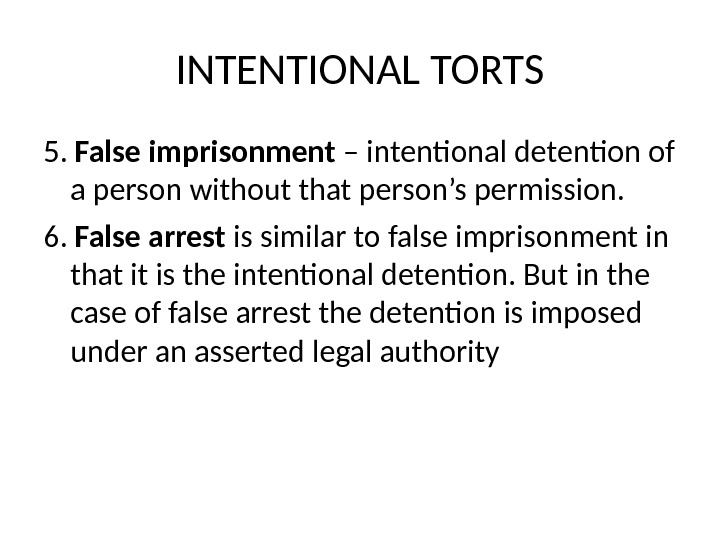
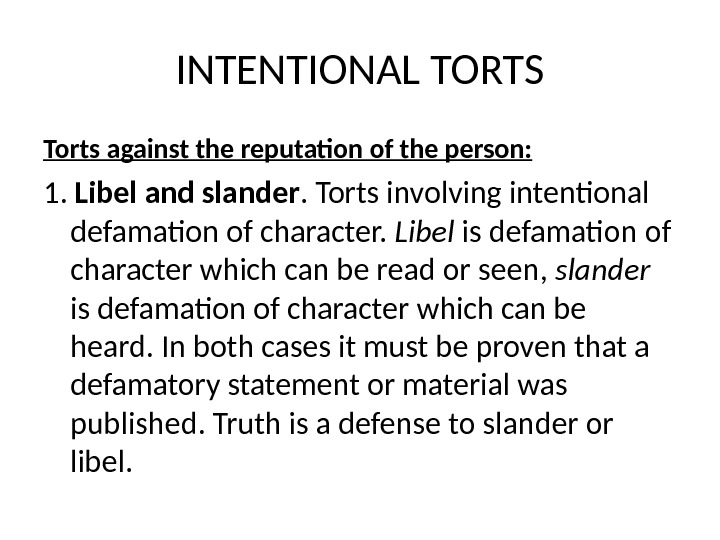
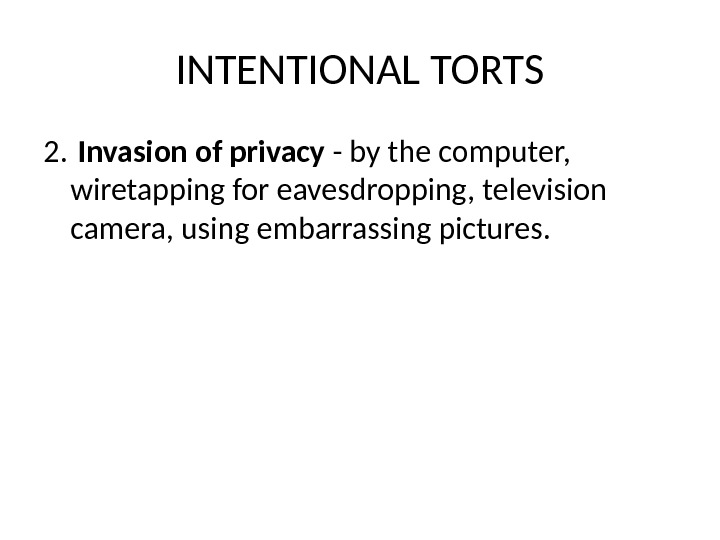
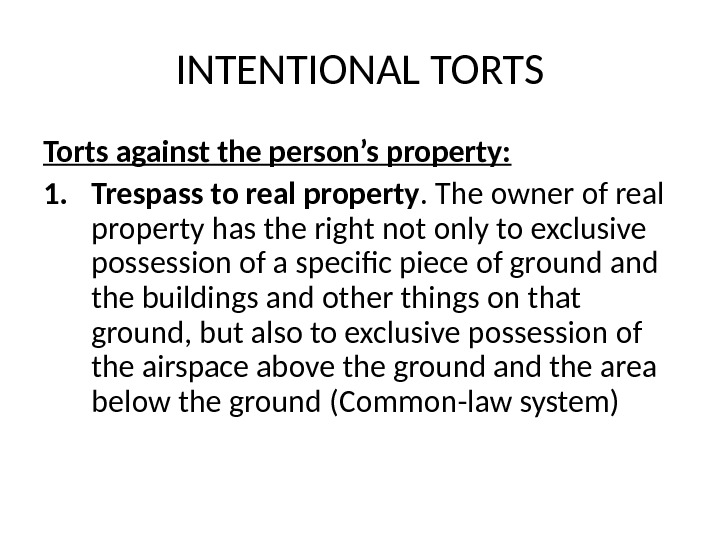

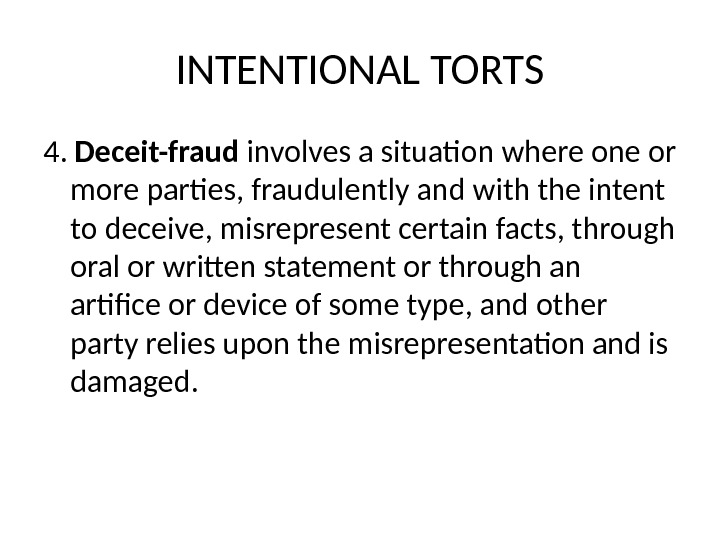
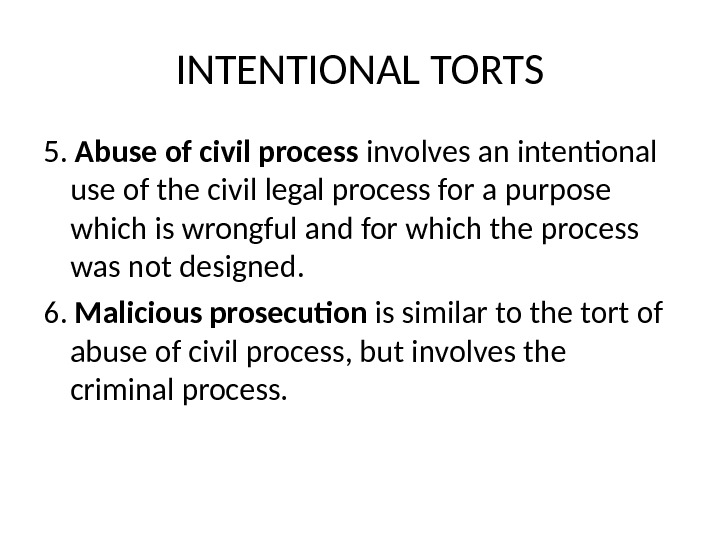
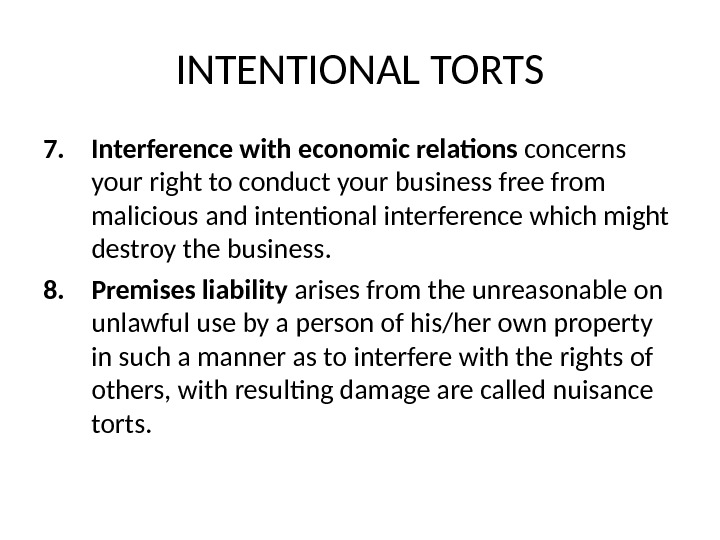
civil_law_intentional_torts.ppt
- Размер: 123.5 Кб
- Количество слайдов: 11
Описание презентации CIVIL LAW INTENTIONAL TORTS Intentional torts against physical по слайдам
 CIVIL LAW INTENTIONAL TORTS Intentional torts against physical person against the reputation against the property of the person
CIVIL LAW INTENTIONAL TORTS Intentional torts against physical person against the reputation against the property of the person
 INTENTIONAL TORTS Common torts against the physical person: 1. Assault – is an intentional act by one person which causes another person to be in immediate apprehension for his/her safety. Apprehension doe not necessarily mean fear. 2. Battery – is an intentional contact or touching of another person without that person’s permission and without legal justification. . The contact or touching must cause injury.
INTENTIONAL TORTS Common torts against the physical person: 1. Assault – is an intentional act by one person which causes another person to be in immediate apprehension for his/her safety. Apprehension doe not necessarily mean fear. 2. Battery – is an intentional contact or touching of another person without that person’s permission and without legal justification. . The contact or touching must cause injury.
 INTENTIONAL TORTS 3. Technical battery occurs when the person gives consent to physical contact of one sort and then a different kind of contact occurs or the terms of the consent are exceeded. 4. Intentional infliction of mental distress may be defined as an act or the use of words by a person with the intent of causing another person to experience anxiety, fright, terror, or some other form of emotional and mental distress.
INTENTIONAL TORTS 3. Technical battery occurs when the person gives consent to physical contact of one sort and then a different kind of contact occurs or the terms of the consent are exceeded. 4. Intentional infliction of mental distress may be defined as an act or the use of words by a person with the intent of causing another person to experience anxiety, fright, terror, or some other form of emotional and mental distress.
 INTENTIONAL TORTS 5. False imprisonment – intentional detention of a person without that person’s permission. 6. False arrest is similar to false imprisonment in that it is the intentional detention. But in the case of false arrest the detention is imposed under an asserted legal authority
INTENTIONAL TORTS 5. False imprisonment – intentional detention of a person without that person’s permission. 6. False arrest is similar to false imprisonment in that it is the intentional detention. But in the case of false arrest the detention is imposed under an asserted legal authority
 INTENTIONAL TORTS Torts against the reputation of the person: 1. Libel and slander. Torts involving intentional defamation of character. Libel is defamation of character which can be read or seen, slander is defamation of character which can be heard. In both cases it must be proven that a defamatory statement or material was published. Truth is a defense to slander or libel.
INTENTIONAL TORTS Torts against the reputation of the person: 1. Libel and slander. Torts involving intentional defamation of character. Libel is defamation of character which can be read or seen, slander is defamation of character which can be heard. In both cases it must be proven that a defamatory statement or material was published. Truth is a defense to slander or libel.
 INTENTIONAL TORTS 2. Invasion of privacy — by the computer, wiretapping for eavesdropping, television camera, using embarrassing pictures.
INTENTIONAL TORTS 2. Invasion of privacy — by the computer, wiretapping for eavesdropping, television camera, using embarrassing pictures.
 INTENTIONAL TORTS Torts against the person’s property: 1. Trespass to real property. The owner of real property has the right not only to exclusive possession of a specific piece of ground and the buildings and other things on that ground, but also to exclusive possession of the airspace above the ground and the area below the ground (Common-law system)
INTENTIONAL TORTS Torts against the person’s property: 1. Trespass to real property. The owner of real property has the right not only to exclusive possession of a specific piece of ground and the buildings and other things on that ground, but also to exclusive possession of the airspace above the ground and the area below the ground (Common-law system)
 INTENTIONAL TORTS 2. Trespass of personal property. This tort allows to owner of personal property to bring an action against a person or persons who interfere with his/her exclusive possession of an item of personal property. 3. Conversion is the unlawful taking and use of personal property owned by another person. It is the conversion of another’ person’s property to your own use.
INTENTIONAL TORTS 2. Trespass of personal property. This tort allows to owner of personal property to bring an action against a person or persons who interfere with his/her exclusive possession of an item of personal property. 3. Conversion is the unlawful taking and use of personal property owned by another person. It is the conversion of another’ person’s property to your own use.
 INTENTIONAL TORTS 4. Deceit-fraud involves a situation where one or more parties, fraudulently and with the intent to deceive, misrepresent certain facts, through oral or written statement or through an artifice or device of some type, and other party relies upon the misrepresentation and is damaged.
INTENTIONAL TORTS 4. Deceit-fraud involves a situation where one or more parties, fraudulently and with the intent to deceive, misrepresent certain facts, through oral or written statement or through an artifice or device of some type, and other party relies upon the misrepresentation and is damaged.
 INTENTIONAL TORTS 5. Abuse of civil process involves an intentional use of the civil legal process for a purpose which is wrongful and for which the process was not designed. 6. Malicious prosecution is similar to the tort of abuse of civil process, but involves the criminal process.
INTENTIONAL TORTS 5. Abuse of civil process involves an intentional use of the civil legal process for a purpose which is wrongful and for which the process was not designed. 6. Malicious prosecution is similar to the tort of abuse of civil process, but involves the criminal process.
 INTENTIONAL TORTS 7. Interference with economic relations concerns your right to conduct your business free from malicious and intentional interference which might destroy the business. 8. Premises liability arises from the unreasonable on unlawful use by a person of his/her own property in such a manner as to interfere with the rights of others, with resulting damage are called nuisance torts.
INTENTIONAL TORTS 7. Interference with economic relations concerns your right to conduct your business free from malicious and intentional interference which might destroy the business. 8. Premises liability arises from the unreasonable on unlawful use by a person of his/her own property in such a manner as to interfere with the rights of others, with resulting damage are called nuisance torts.

